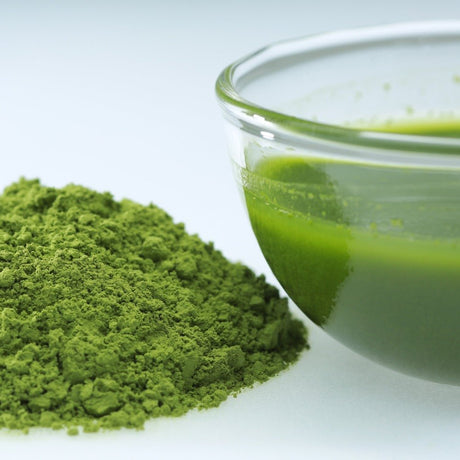
長田製茶の単一品種抹茶セット
ブレンドされていない単一の品種を味わうことは、抹茶(そしてお茶)に関する知識を深める素晴らしい方法ですが、同じ生産者が意図的にシリーズ化している場合にのみ有効です。風味と品質は、栽培技術(遮光、施肥など)、収穫時期と方法、加工、精製、粉砕技術など、多くの要因によって左右されます。これらの要因を意図的に調整しなければ、品種を有意義に比較することはできません。幸いなことに、茶匠の長田夏美氏は、静岡産の5種類の抹茶をブレンドしました。
🍵 全国の茶農家や生産者、職人の商品を90ヵ国以上に発送実績。英語通販サイトの日本語化はまだ途中ですが、よろしくお願いします!

ブレンドされていない単一の品種を味わうことは、抹茶(そしてお茶)に関する知識を深める素晴らしい方法ですが、同じ生産者が意図的にシリーズ化している場合にのみ有効です。風味と品質は、栽培技術(遮光、施肥など)、収穫時期と方法、加工、精製、粉砕技術など、多くの要因によって左右されます。これらの要因を意図的に調整しなければ、品種を有意義に比較することはできません。幸いなことに、茶匠の長田夏美氏は、静岡産の5種類の抹茶をブレンドしました。

今日は雲が白くてふわふわです。 浜辺の砂はとてもサラサラしていて、風と私たちの足跡が美しい跡を残しました。 日本の発酵大豆である納豆は、ぬるぬるした(日本語:ヌルヌル)食感があり、不快感を覚える人もいます。 写真提供:自然さん (photo-AC) 。 日本語に少しでも詳しい方、あるいは日本に訪れたことがある方は、日本の面白い擬音語に出会ったことがあるかもしれません。外国人にとって、それらはしばしば興味深いものとなるでしょう。この記事では、もちろん日本語の擬音語を網羅的に列挙することはしません。しかし、擬音語で名前が付けられた日本茶があることをご存知でしたか?今回は、そんなユニークなお茶をご紹介します! バタバチャ 今日取り上げる3種類のお茶の中でおそらく最もよく知られているバタバタ茶は、富山県朝日町蛭田郡が発祥の15世紀の伝統的な番茶です。発酵後のお茶を煮出して作るので、中国のプーアル茶を少し思い出させるかもしれません。しかし、伝統的に泡立ててひとつまみの塩で泡立てて飲むという点で独特です。朝日町蛭田郡が発祥ですが、歴史的には隣県の新潟県糸魚川地方でも楽しまれてきました。なぜ「バタバタ」なのでしょうか。日本語で「バタバタ」は騒ぎや慌ただしさを表す擬音語です。副詞として使われる場合は、羽ばたき(例:鳥の羽)、ガタガタ、またはがたがたという音を意味します。このお茶の特徴は、このユニークな地域のお茶を泡立てて泡立てる音を捉えていることです。 バタバチャの葉。富山県朝日町の風流番茶店のバタバチャ。写真提供:フリュー 歴史的ルーツ このお茶に関する最古の記録は、1472年に浄土真宗第8代座主である蓮如上人がこの地を訪れた際に遡ります。蓮如上人は、地元の人々がこのお茶を米と酒と混ぜて一つの料理として飲食していたことを記しています。このお茶はこれより以前から飲まれていたという説もあり、その正確な起源は不明ですが、その製法は中国から伝わったと言われています。 残念ながら、旭町ビルダンの茶生産は1970年代までに途絶え、人々は福井県美浜村の茶農家、清水秀夫氏からバタバタ茶を購入していました。1975年、高齢となった清水氏は茶生産を中止することを決め、富山県小杉村の萩原明伸氏が製法を学び、茶生産を引き継ぎました。その後、1980年代に旭町ビルダンの人々は、この貴重な伝統を守るため、萩原氏からバタバタ茶の製法を学ぶことにしました。こうした努力により、1990年代には村に茶園が作られました。香川大学の宮川金次郎教授の協力を得て、村は茶樹の品質向上と茶葉の加工に取り組み、現在では地元商工会議所が主導する地域プロジェクトとして茶生産が進められています。とても素晴らしい話ですね! 現在の旭町ビルダンのバタバチャの製造工程 バタバタ茶の収穫は、やぶきた品種では例年7月下旬に行われます。茶葉は枝の上部とともに収穫されます。 葉と若い枝は村のバタバタチャ工場に運ばれ、粗く切り刻まれます。 蒸す工程により、酵素の酸化作用が停止します(*この工程により、お茶はウーロン茶や紅茶ではなく、緑茶として分類されることに注意してください)。 熱が発散され、太い枝が除去されます。 茶葉は粗く揉まれ、「むろ」と呼ばれる大きな箱の中に布を敷いて積み重ねられます。 茶葉は、発酵を均一に進め、茶葉の損傷を防ぐため、2~3日間かけて60℃(華氏140度、*これは非常に重要です! )の温度に保たれます。この60℃の温度を保つ工程は、合計約40日間にわたり行われ、熟練した技術と労力を要します。温度は発酵自体の熱によって維持されるため、中心部はより高温になります。高温を避けるため、茶葉は別の「ムロ」に移動させたり、山を組み替えたりします。茶葉が十分に柔らかくなり、温度上昇が止まったら、この工程は完了です。 9 月の初めに、茶葉はようやく室内または日陰で乾燥され、その後、酸化プロセスを完全に止めるために天日乾燥 (2 ~ 3 日間) される準備が整います。 この大変な作業と、バタバタ茶が夏の最も暑い時期に発酵させられるという事実を考えると、この地域の伝統的なお茶の味をより深く理解できるのではないでしょうか。ウェブサイトは日本語ですが、旭町にはバタバタ茶を作る村人たちのスナップ写真が掲載された、 とても素敵なウェブサイトがあります。...

日本茶を飲むとき、そのお茶がどんな品種から作られているか考えたことはありますか?「品種」というと、お茶通の世界のイメージが強いかもしれません。しかし、Yunomiではお茶の説明に品種を明記することも多く、またお茶好きの方も単一品種のお茶を求めていることから、今日は日本茶の品種について触れてみても良いのではないかと思いました。 イアン・チュンが以前投稿した栽培品種に関するブログ記事で述べられているように、栽培品種とは栽培された様々な品種のことです。つまり、栽培品種とは、人間が望ましい特性を持たせるために品種改良した植物のグループです。茶の木であるツバキ( Camellia seninsis )の品種改良(日本語:品種改良)は明治時代に始まりました。今日では、未登録の栽培品種を含めると、日本茶の栽培品種は100種類以上あります。 しかし、栽培品種とその改良はお茶の世界だけにとどまらないことをここで触れておくのは重要かもしれません。例えば、リンゴやトマトには様々な品種や栽培品種があります。それぞれ風味や形が異なり、植物自体も見た目が異なり、成長の仕方や成熟時期も異なります。同様にお茶にも、春に生育を始める時期や環境要因に対する感受性が異なる様々な栽培品種があり、それぞれが個性豊かなお茶を生み出します。 数え切れないほど多くの品種から選べる茶葉の中で、茶農家はどのようにして自分の茶園で栽培する茶の品種を選ぶのか疑問に思うかもしれません。これはいくつかの主要な要因によって決まります。ここでは3つの要因について触れたいと思います。 お茶の種類 この地域の気候 茶畑の面積 お茶の種類 一般的に、日本茶の品種は、 煎茶、 玉露・碾茶、釜炒り茶を作るために栽培されています。どの品種からでもあらゆる種類のお茶(煎茶、ウーロン茶、紅茶など) を作ることができますが、茶農家は作りたい特定のお茶に合った品種を選びます。そのため、煎茶を作るための品種を選ぶ際には、煎茶に加工したときに味と香りが良い品種を検討します。これらの品種は、玉露や碾茶の場合、遮光を考慮する必要があるため、それらと異なる場合があります。そのため、遮光してもよく育ち、さわやかな緑色になる品種が望ましいです。釜炒り茶を作るための品種を選ぶ際には、葉を釜炒りしたときに心地よい香りを放つ品種を検討します。 この地域の気候 お茶は日本各地で栽培されており、南端の鹿児島から関東地方まで、その地域によって気候が異なり、それぞれの気候に適した品種が存在します。例えば、 鹿児島は南部のお茶の主要産地で、温暖な気候で朝霧もあまり発生しません(※ただし、地域の地形にも左右されます)。そのため、鹿児島では、シーズンの早い時期に芽を出す(成長し始める)品種(日本語では、これらの品種は早生種と呼ばれます)が望まれます。実際、鹿児島のいくつかの茶産地は、 ユタカミドリやサエミドリなどの品種を使った走り新茶の産地としてよく知られています。一方、寒冷な地域では、晩霜による被害を避けるために出芽が遅い品種や、 オクミドリ品種(日本語では晩生種と呼ばれる)などの寒さに強い品種が望まれる場合があります。 茶畑の面積 茶農家が広大な土地と複数の茶畑を所有している場合、多くの場合、複数の茶品種を栽培しています。なぜでしょうか?単一の品種に頼ると、収穫時期が全て同時に到来し、収穫だけでなく加工も非常に困難になります。そのため、茶農家では通常、出芽時期の異なる数種類の品種を栽培し、収穫と加工を数週間かけて分散させます(例えば、早生、中生、晩生の品種を組み合わせるなど)。 福岡県八女市にある久万茶園は、単一品種で収穫時期がわずかに異なる多様な茶を生産する茶園の好例です。例えば、「さえみどり」、「やぶきた」、「おくゆたか」という3種類の品種の収穫日は、それぞれ4月14日、20日、30日でした。この茶園は南部に位置しているため、4月という比較的早い時期に収穫が行われます。しかし、収穫時期はそれぞれ数日間ずつずれていることがわかります。 福岡県八女市久万茶園の山岳煎茶「さえみどり」 。パリ2020年日本茶セレクションで金賞(Prix D'OR)を受賞しました。 やぶきた品種:なぜ優勢なのか? 栽培品種にあまり詳しくなくても、しばらく日本茶を飲んでいる方なら、「やぶきた」という品種の名前を聞いたことがあるでしょうし、試飲して(願わくば)楽しんだことがあるかもしれません。 1908年に静岡県の農家、杉山彦三郎氏によって開発されたやぶきたは、多くの優れた特性を備えています。この品種は耐霜性があり、様々な地域に適応し、生育も均一で、風味も優れています。杉山氏がこの斬新な農業手法と茶の品種開発を始めたのは、品種改良や、種子からではなく栄養繁殖に関心がほとんどなかった時代だったということを認識することは重要かもしれません。 当時の茶園の大半は種子を使用しており、最も多かったのは後述する在来種/自生種と呼ばれる品種でした。茶は非常に容易に他家受粉するため、1つの植物が別の植物を受粉させることになります。そのため、2つの植物が他家受粉するだけで、わずかに異なる種子がたくさんできます。つまり、当時の主流の茶農家の戦略は、遺伝子に任せるというものでした。その結果、芽吹きの時期も成長速度も風味もわずかに異なる、わずかに異なる様々な茶の木が畑にできました。日本茶の専門家の多くは、日本茶はさまざまな栽培品種(在来)の混合物であることが特徴であり、これらの多様な風味のブレンドこそが有名な日本茶を生み出すのだと強く信じていたため、品種改良に投資することを気にしませんでした。...

本日は、奈良県山添村を拠点とする若くクリエイティブな茶農家、茅下由樹さんへのインタビューをお届けします。茅下さんの小さな茶園は、10年間にわたり、天日干し釜炒り茶と呼ばれる地域の伝統茶の生産に注力してきました。伝統的な製法を尊重しつつ、現代的で低コストな製法の開発に特化しています。現在も、あまり一般的ではない品種を用いたプロジェクトが進行中で、今後の茶の発展が期待されます。 茶農家になるまでの道のり Moé:本日はお時間をいただき、ありがとうございます。イアンさん(イアン・チュン)は、あなたが作られる希少なお茶に大変感銘を受けたようで、また、あなたには感動的なストーリーがあると伺い、お会いできてとても嬉しいです。まずは、あなたが茶農家になるまでの道のりについてお伺いしたいのですが、少しご経歴を教えていただけますか? 茅下さん:そうですね、私は大阪出身で、兄弟姉妹をはじめ、家族に農家はいません。サラリーマンの家庭に生まれました。大学を卒業して、農家になりたいと思い始めました。里山のような田舎暮らしがしたかったんです。それで農業の研修を始めました。最初は茶農家になるつもりはなかったんです。有機栽培の農家として研修を受けたんです。 インターンシップでは、合計約3年半、3人の農家さんのもとで研修を受けることができました。あるインターンシップでは、有機栽培で野菜を育てている生産者のもとで研修を受けました。また、自然栽培で野菜を育てている生産者さんのセミナーも受講しました。それが興味深かったので、その生産者さんのもとでインターンシップをすることにしました。そこではお茶も栽培していましたが、当時の私は農作物作りにとても集中していました。インターンシップ中は、お茶農家になろうとは全く考えていませんでした。野菜生産者になることを目標にインターンシップに取り組んでいました。 それでも、ちょうどその頃、京都で「 京都吉田山大茶会」 (2010年から毎年開催されているお茶の祭典)というイベントがあると聞いて、当時は農産物の仕事をしながら茶畑の仕事もしていたので、「行ってみようかな」と思ったんです。そこで初めて九州の釜炒り茶を飲んで、すごく印象に残って。「こんなお茶もあるんだ!」って。「お茶って面白い」って思えるようになったのがきっかけですね。だから、この釜炒り茶を飲んでから、一気にお茶にはまっていったんです。 Moé:釜炒り茶との出会いからインスピレーションを得たなんて、素敵なお話ですね。Yunomiでこれまで茶農家さんへのインタビューをさせていただいたのですが、皆さんお茶農家の出身で、代々続く農家さんもいらっしゃいます。そこで、ご自身で茶農家として独立された若い方として、どのような特有の課題に直面してきたのか、お聞かせください。 茅下さん:まず、本当にゼロからのスタートだったので、茶園経営にはかなりの費用がかかることを考えると、お茶で生計を立てるというのは現実的ではありませんでした。適切な設備や機械を揃えるには、かなりの資金が必要です。 でも、その頃、奈良のお茶屋さんを訪れた時に、そのお茶に感銘を受け、そのお茶を淹れている農家さんを紹介していただけないかとオーナーにお願いしたんです。すると、現在ティーファーム水戸茶で作っている天日干し釜炒り茶(※以下、天日干し釜炒り茶)を出していただいたんです。この釜炒り茶を飲んだのは初めてで、九州の釜炒り茶を初めて飲んだ時と同じくらい感動しました。本当に美味しかったんです。 そして、幸運なことに、そのお茶屋さんが、このお茶を作っている茶農家さんを紹介してくれました。時間をかけて、この天日干しの釜炒り茶の作り方を学ぶことができました。このお茶はとてもシンプルで、機械もあまり必要ありません。そのため、当初はそれほど費用もかかりませんでした。また、煎茶の加工ほど技術や技能も必要ないと感じています。こうして、ゼロから始めることができました。 茶園みとちゃでは2人乗りの機械でお茶を摘んでいます。 天日干し釜炒り茶 萌え:確か、この天日干しの釜炒り茶の作り方は熊野の茶師匠から教わったんですよね?このお茶の作り方を習得するのに、どれくらいの期間、師匠のもとで修行されたんですか? 茅下さん:そうですね、農家として独立した頃から父に師事し始めて、自分の農作業と並行してやっていました(今も続けています)。熊野地方はお茶の収穫時期が少し早いので、手伝いに行って師匠から学び、その後山添(茶園三戸茶)に戻って同じお茶を淹れる。これを毎年続けているので、私にとってのお茶のサイクルのようなものですね。もう10年くらいになると思います。 萌え: 釜炒り茶というと、九州、特に長崎県、佐賀県、 宮崎県といったところを思い浮かべますが、奥様が作られている天日干しの釜炒り茶は、熊野(和歌山県)が発祥なのですか? 茅下さん:実は熊野が発祥の地かどうかは分かりませんが…日本では昔から、多くの人が民衆茶を淹れていました。それはあくまでも自分や家族のために淹れるお茶で、利益を得たり、商売にしたりするためのものではありませんでした。こうした民衆茶は日本各地に存在していたと思います。しかし、時代とともに煎茶の製法が発達し…今では日本茶といえば煎茶が主流です。天日干しの釜炒り茶はあまり聞きませんよね?昔は家庭でよく作られていたのでしょうが、機械を使わずに淹れるので大変な手間がかかりました。だから、たまたま熊野が貴重な茶が保存されてきた場所なのかもしれませんね。 萌:素敵ですね!今、伝統的な民芸茶を作られているなんて、本当に素晴らしいですね。それで、今日はなぜ天日干しの釜炒り茶を作られるのか、その理由を教えていただけますか? 茅下さん:はい、とても美味しかったですし、淹れ方も簡単でした。それに、一から作ったので、他の日本茶に比べてコストもそれほどかかりませんでした。現実的な選択だったと思います。 ZOOMインタビューで熊野地方に伝わる天日干し釜煎茶について熱く語る茅下さん。 Moé:これは好奇心からであり、釜炒り茶についての私の知識の少なさからなのですが、釜炒り茶を作るには、かぶせ茶や玉露を作るときのように茶樹に日陰を作らないんですよね? 茅下さん:いえ、シェーディングシステムなどは使っていません。 Moé:ところで、天日干し釜炒り茶と釜炒り茶の違いって何ですか?名前からすると天日干しというところだと思うんですが、違いはそれだけですか? 茅下さん:基本的には、最初の工程、つまり鉄釜で茶葉を焙って揉むところまでは一緒です。ただ、天日干し釜炒り茶の場合は、機械を使わずに自然乾燥させます。つまり、自然の光で乾燥させるということですね。 以下は、茶園みとちゃが描いた、天日干し釜炒り茶の作り方を描いた漫画です。昔ながらの製法と、現在の同農園で行われている製法を比較しています。 ステップ1~3: ステップ4~6:...

おそらく、あなたは日本茶、特に番茶をご存知で、実際に飲んだことがあるかもしれません。しかし、三年番茶とは一体何なのでしょうか?普通の番茶やほうじ茶とはどう違うのでしょうか?今日は、皆さんが新しいお茶を発見したり、お茶にもっと親しんだりするお手伝いができれば幸いです。 一般的に、日本茶( 煎茶)は、茶の木の新芽を収穫、蒸し、加工して作られます。これらの種類のお茶は、新鮮なうちに飲むのが最高とされています。しかし、三年番茶は、3年間刈り取られていない茶の木、または3年間成熟した茎と葉から作られるという点で少し異なります。煎茶と比較して、人によっては刺激となる可能性のあるカフェインとタンニンが少ないため、あらゆる年齢層に優しいお茶とされています。日本では、このお茶はそのまま飲むか、梅を少し加えたり、醤油を少し加えたり、すりおろした生姜を加えたりして楽しむ人もいます。 現代の三年番茶の2つの製法 1. 3年間熟成 三年番茶を作るための最初の方法は、お茶を3年間熟成させることです。茶樹から新芽を摘むのではなく、秋に収穫した番茶(成熟した茶葉と茎)を使用します。これらの茶葉の茎は、荒茶(ふるいにかけていない粗茶)や多くのお茶と同様に蒸されますが、その後、常温で3年間熟成されます。これが三年番茶の条件です。湯呑みでは、 樽井茶園の三年番茶と上島さんの三年番茶がこの方法で作られています。 樽井茶園の三年番茶を購入 上島さんの三年番茶を買う このお茶の起源は、唐の時代に日本に来た僧侶の影響を強く受けたと言われています。元々は、冬の寒い時期に野生の茶の木を刈り取り、茶壺(ちゃつぼ)に入れて蓋をし、和紙を何層にも重ねて密封し、3年間貯蔵・熟成させて作られていました。 1つの 2. 3年間の茶樹栽培 二つ目の方法は、3年間刈り取られたり収穫されたりしていない葉と茎を刈り取る方法です。この代替三年番茶を作る工程は、蒸し、乾燥、焙煎という点で一般的な荒茶の工程と似ていますが、この方法では薪火で焙煎する点が異なります。この方法で作られた三年番茶は、長い生育期間のため、はっきりとした、全く異なるテロワール(土壌)を持っています。伝統的には、すべての工程はすべて手作業で行われていました。 あゆみ農園のワハハ三年番茶は、 3年間刈り取られることなく育てられた茶樹から作られています。 あゆみ農園の「ワッハハ三年番茶」は、3年間放置された茶樹から作られています。あゆみさんは友人たちと協力し、茶樹の倍以上にもなった枝を切り落としました。その後、枝を整理(絡み合った蔓や草を取り除く)し、トラックに積み込みます。写真は、昨年2月の満月の日に収穫した三年番茶の様子です。写真は、あゆみ農園(チットラット)にて。 yumi FarmのWha-ha-ha 三年番茶を購入する マクロビオティック愛好家のためのお茶 日本には、植物の生育環境によって温冷の性質を持つとする中国伝統医学の影響を受けた、独自のマクロビオティック食文化があります。こうした考え方を持つ人にとって、三年番茶は、太陽の光を浴びた若い上部の葉ではなく、茎の下部、さらには成熟した葉から作られるため、根菜に近い特性を持つと言えます。そのため、マクロビオティックの観点から見ると、体を温める効果があると考えられます。 三年番茶は番茶やほうじ茶とどう違うのですか? このブログ投稿を締めくくる前に、番茶とほうじ茶の違いについて触れ、三年番茶がどのような位置づけにあるかを理解したいと思います。日本茶にはたくさんの種類があるように思えることもあるので、これらの違いを強調することで、日本茶の用語にもっと慣れ親しんでいただければ幸いです。 番茶(番茶) 番茶は民間茶として知られ、一般的には大きく育った茶葉から作られたお茶を指します。番茶は通常、煎茶よりも大きな茶葉から作られ、秋から初冬にかけて摘まれます。一方、煎茶は通常、春に摘まれた最初の茶葉から作られます。番茶の風味は渋みが強い傾向がありますが、春摘みの緑茶よりもカフェイン含有量は低くなります。 煎茶が地域によって異なるように、番茶にも様々な種類があります。一般的に「番茶」とは、比較的シンプルな製法でありながら、多様な製法で作られる、無数の民間茶・地方茶を指します。これらの民間茶はますます希少になり、特定の民間茶で知られる地域に住んでいる人でも、これらの逸品を知らない人もいるほどです。番茶は煎茶に比べて品質が低いと考える人もいますが、番茶には地域の歴史、文化、そしてテロワールが反映されており、その違いは見逃せません。様々な種類の番茶があり、抹茶のアフターティーとしても最適です。 風流番茶店の阿波番茶は、徳島県上勝町の希少な民俗茶です。 一般的に番茶は煎茶に比べて品質が低いと言われていますが(栽培と加工は煎茶と同じで、使用する茶葉の品質が異なるため)、番茶を過小評価すべきではありません。番茶には様々な種類があり、試してみる価値は十分にあります。さらに、抹茶のアフターティーとしても最適です!...
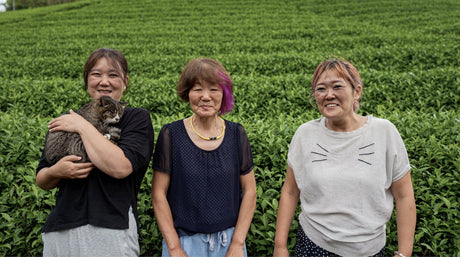
今回は、 京都府和束町にある茶園「喜六茶園」の5代目茶農家、堀めぐみさん(通称:うい)へのインタビューをご紹介します。喜六茶園では、お母様の陽子さん、そして妹の弘恵さんと共に、お茶の栽培と加工を行っています。彼らのお茶が特別なのはなぜでしょうか?喜六茶園では、独自の製茶設備と抹茶加工設備を備え、それぞれの茶畑を丁寧に手入れすることで、個性豊かなシングルオリジンのお茶を生み出しています。堀さんは、女性が茶園を経営するのは当然のことだと語りつつも、海外との繋がりや、身近なところでは6匹の猫たちからのサポートや心の支えに感謝していると語りました。日本の茶産業の衰退を懸念する一方で、喜六茶園の女性たちは希少品種の栽培に情熱を注ぎ、それらを使った限定生産の抹茶を製造し、日本茶の世界に新たな活力をもたらしています。 もえ:では、堀さん、今日はお誕生日の日にインタビューを受けてくださってありがとうございます!そして、お誕生日おめでとうございます! Yunomiの「きろく茶園」のページから堀さんの経歴を少しだけ拝見したのですが、具体的にどのような経緯で茶農家になろうと思ったのですか? 堀さん:誕生日のお祝いありがとうございます。茶農家になろうと思ったきっかけについてですが…実は、うちの兄弟はみんな女性なんです。正直に言うと、最初は茶畑の仕事があまり好きじゃなかったんです。というのも、幼い頃からお茶のことしか考えていない両親の姿を見て、お茶のために生きているような気がしたからなんです。だから、私ももっと注目されたかったんだと思います(笑)。でも、親の仕事は自分たち(子供たち)が継がないと誰も継がないんじゃないか、という思いがずっとあったんです。 実は結婚と大阪での仕事でしばらく和束を離れていたんです。繁忙期には大阪から和束に手伝いに行っていたんです。でもそのうち結婚生活が破綻して、気持ちが重くなって。それで茶畑に戻って来たんです。お茶の仕事って、すごく大変な仕事だけど、心は優しいじゃないですか。それで、父が亡くなった時も、また和束の茶畑を手伝っていたんです。そして、一人でできる仕事じゃないから、母と一緒に両親の仕事は継ごうと決めたんです。でも、私が継ごうと決める前に、何人かの男性から「(私が)代わりにやらないか」と誘われたんです。でも、「私にできます」と断りました。それからは、主に二人で仕事を続けています。 京都府和束町の茶畑で働く喜六茶園の女性たち。 もえ:ということは、きろく茶園では主にあなたとお母さんがいらっしゃるんですか? 堀さん:はい、はい。うちの碾茶工場は、妹が担当しています。普段は別の仕事を持っているのですが、時間がある時は手伝ってくれます。和束町で茶農家が自前の碾茶工場を持つのは珍しいのですが、うちは数少ない家の一つです。これは私たちの伝統なんです。一般的には、多くの茶農家が収穫した茶葉を共同工場に持ち込んで加工するのですが、私たちは収穫から製造まで、すべての工程を自分たちで行っています。まるで子供を育てているような、とても素敵な時間ですね(笑) 。とはいえ、繁忙期は仕事が山積みで、睡眠不足になり、夜中の3時まで起きていることも…。工場を持つということは、健康や心身へのリスクが高まるということですね。ありがたいことに、収穫期にはアルバイトの方に少し手伝ってもらうことができています。 もえ: 一番茶、二番茶の季節のことですか? 堀さん:はい。この時期は「線路が命」と言います。つまり、茶摘みの時期は、すべての準備が万端でいなければならないということです。茶葉を摘んだら、次の工程へ、そしてまた次の工程へ…。だから「線路は命」と言うんです。パートさんたちの手も増えて、工程がスムーズに進むようになってきています。 Moé:先代の世代と比べて、お茶栽培や農業のやり方はどのように変化しましたか? 堀さん:そうですね、私は口承で聞いた知識しかないので100%確かなことは言えないのですが、当時は皆さんが知っているような機械も車も何もありませんでした。私の曽祖父は森に入ってノコギリを持って木を切り、「開墾」(かいこん;農地を作るために森を切り倒す作業)という作業をしていました。それから土を準備し、穴を掘って茶の木を植えていました。茶園の規模は今よりずっと小さくて、茶園が一つあれば、かなり立派な茶園とされていたと思います。収穫時期になると、手作業かハサミを使って茶葉を摘んでいました。今のような巨大な製茶工場はありませんでした。だから茶農家の中に、茶葉を揉み、加工して製品化する小規模な製茶工場があったんです。 今では機械化が進み、茶園の規模は拡大し、より効率的に収穫できる機械も導入されています。私たち喜六茶園にも自社の碾茶工場はありますが、今では共同工場に茶葉を持ち込み、茶農家の方々が茶葉の揉み、加工、製造を委託するのが一般的です。そこから農協の組合員が市場へ持ち込み、そこで価格が決まる仕組みです。 かつては茶農家は茶を栽培するだけで生計を立てることができましたが、今は少し難しくなっています。そして昨年はコロナ禍で状況が一変しました。茶市場では新茶の価格が下落し、二番茶と同程度の価格になってしまいました。日本の茶業界は大きなプレッシャーを感じており、危機感を感じています。これほど直接的な影響が出るとは思っていませんでした。 きろく茶園の堀恵美さんとのインタビューをZoomで撮影したスナップショット Moé:はい、コロナは様々な形で(間接的に)影響を与えていますし、今も影響を与え続けています。これは私たちが互いにつながっていることを示しており、新しい常態になっているようですね。でも、特に和束町に関しては、私が訪れた時、若い茶農家の方々がとても熱意を持っていると感じました( おぶぶ茶園の「アッキー」(北明宏)さんのように)。 そして修さん? 堀さん:そうですね、茶農家はほんの数人ですね。高齢化が進んでいる中で、この仕事を担う若い世代が足りないと感じています。私が初めて和束町に来た頃と比べて、人口は半分に減っています…ということは、茶業を継ぐ人はさらに少なくなるということです。10~15年後には、和束町には放置された茶畑がたくさんあるのではないかと危惧しています。残念なことに、今の日本人は世代が変わってきていて、急須ではなくペットボトルでお茶を飲むようになってきています。日本人自身もお茶をあまり大切にしていないように感じます。 これがこの辺りの現実なんです…ペットボトルのお茶は安く買えるし、じゃあうちのお茶みたいな高品質でいいお茶を誰が買ってくれるんだろう?っていうのが、海外の市場の方が希望なんですよね。実は、喜六茶園もSNSのおかげで注目や応援を少しずつもらえるようになってきているんです。例えば、抹茶を点てている写真をアップすると、喜んでくれたり、コメントをくれたりするのは、実は嬉しい驚きなんです(笑)。こういう時だからこそ、すごく心が温かくなるんです。パンデミック以降、海外にも繋がりや友達が増えました。まあ、直接会ったことはないんですけど、みんな私たちの友達なんです。日本ではあまり注目されないんですけど、海外では「女性3人で茶園をやっているから応援したい」って言ってくれる人がたくさんいるんです。 Moé:日本の状況は残念ですが、海外から応援していただいていると聞いて嬉しいです。本当に心強いですね!ところで、キロク茶園の特徴の一つとして、女性3人で茶園を運営しているということが挙げられますか?また、そのことで苦労されたことはありますか? 堀さん:そうですね、それが1番ですね。そして、私たちが直面している課題に関して言えば、実はとてもシンプルです。ええ、基本的に私は背が低くてスタミナもあまりないんです。でも、最終的には何でもできるんです(笑)。 Moé:ああ、確かに心は私たちに何ができるか、何ができないかという制限を設けてしまう傾向があるんですね…。残念ながら、まだ喜六茶園のお茶については詳しくないのですが、あなたの茶園を象徴するお茶、あるいは特におすすめしたいお茶はありますか? 堀さん:朝乃香という品種があります。鹿児島原産の品種(枕崎研究所で育成、1996年登録)で、やぶきたと中国原産の品種を掛け合わせたものです。和束町で朝乃香を栽培したのは、私たちの茶園が初めてです。今は煎茶用の品種なので、朝乃香を栽培して煎茶を作っている方は他にもいらっしゃると思いますが、私たちの茶園では朝乃香を使って抹茶を作っています。全国的に見ても、朝乃香抹茶を作っているところは他にあるのかな…ちょっと分かりません!そういう意味では、かなり珍しいかもしれませんね。なので、私たちの看板商品と言えるでしょう。抹茶として(点てると)とてもいい泡立ちで、ベルベットのような滑らかさとフルーティーな香りが楽しめます。そうそう、今年はお客様と一緒に新しい試みをしてみました。7種類の茶葉を使った抹茶を淹れてみました。そして、アンケートと一緒に抹茶のサンプルをお送りし、どのお茶が一番気に入ったのかを把握し、ご意見を伺うことにしました。 [鐘の音] Moé:すみません、うちの猫が一人で遊んでいるんです…この時間(中央ヨーロッパ時間の午前6時30分頃)に起きているのは彼女だけなんです。 堀さん:猫は6匹いるんですが…...
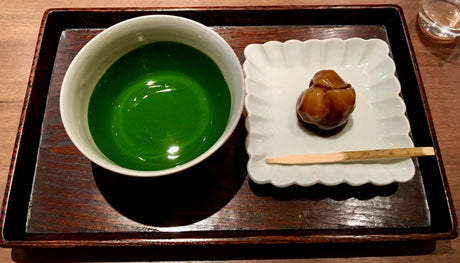
抹茶には2種類の淹れ方があることをご存知ですか?薄茶と濃茶です。おそらく、皆さんがよくご存知の抹茶はこんな感じです。 京都府の一保堂で提供される薄茶抹茶。写真はジミー・バーリッジ氏による。 これは薄茶、つまり皆さんがよくご存知の一般的な種類です。日本のカフェでよく見かける薄茶は、家庭で淹れられたり、出されたりすることが多いです。日本語が少しでもわかる方なら、 「濃(こい)」と「薄(うす)」という文字は、抹茶の濃さを表しています。濃い抹茶は、抹茶と水の比率が高く、より香りと風味が豊かです。 まとめると、 抹茶は通常、収穫前に遮光され、蒸し、揉まずに乾燥させ(日本の緑茶のほとんどは揉みます)、フレーク状に精製され、その後細かい粉末に挽かれた高品質の茶葉です。遮光処理によって苦味のあるカテキンが減少し、代わりにうまみのあるテアニン含有量が増加し、抹茶独特の風味が生まれます。 厚い vs. 薄い 薄茶と濃茶の大きな違いは、その濃さです。薄茶抹茶を飲んだことがある方もいらっしゃるかもしれませんが(お茶のように滑らかですよね?)、濃茶を飲んだことがない方は、濃茶の濃さに驚くかもしれません!実際、濃茶はまるで濃いスープのような、シロップのような濃さです!この濃さは、薄茶に比べて抹茶の量が2~3倍、水の量が少なめだからです。私も初めて濃茶を飲んだ時、見た目だけで「渋い」(日本語で「苦い」という意味)だろうと思いました。 京都府の一保堂で提供される濃茶抹茶。写真はジミー・バーリッジ氏による。 しかし、風味に関して言えば、濃茶に使われる抹茶は一般的に旨味と甘味が強く、苦味は控えめです。そのため、私にとっては、特に和菓子がお茶の強さをうまく和らげてくれたので、かなり濃厚でありながら心地よい体験となりました。 もう少し詳しく説明すると、まるで苔むした緑の夢のような、奥深い世界へと誘われたかのようでした。未知の世界でありながら、不思議なほど馴染みのある魔法の世界に。鮮やかな緑の生命、柔らかくくぐもった音、そして濃厚で湿った空気が重なり合う、宮崎駿監督の映画『もののけ姫』のワンシーンを彷彿とさせるような感覚でした。 青森県奥入瀬の苔むした仲間たち。写真は岸田萌さん。 濃茶には昔風の抹茶パウダーを選びましょう 濃茶に使われる抹茶は甘く、品質も高く、価格も高くなります。日本では、濃茶に合う抹茶を探すときは、一般的に「昔」の文字で探します。一方、薄茶用の抹茶を探す場合は、「白」の文字で探します。もちろん、茶葉販売店の人に尋ねてみるのも良いでしょう。少なくとも日本では、そして海外でも、ある程度の高級な茶葉販売店であれば、濃茶と薄茶の違いを理解しているので、きっと説明してくれるはずです。 Yunomiのサイトでもこの方法を試すことができます! 「mukashi」で検索すると、濃茶に適した抹茶が見つかります。「koicha」だけで検索することも可能です。抹茶パウダーの説明欄に、濃茶に適しているかどうかが記載されています。 松玉園製茶工場の抹茶2種類 (京都府京鍋町)濃い茶の場合は左側の「昔」 、薄茶の場合は右側の「白」の文字に注目してください。商品写真はYunomiより提供。 湯呑みから濃茶を作るのに適した抹茶の例: AOI製茶:西尾抹茶 孫光の昔皇室典礼級濃茶(30g 4900円) AOI製茶:西尾抹茶 天渓 儀式遺産級濃茶(30g 10,000円) 西出製茶所:宇治抹茶 千代昔...

読売新聞は2月21日、農林水産省の統計によると、2020年の日本茶の生産量は前年比15%減の6万9800トンと大幅に減少したと報じた。 静岡県は、政府のデータによると、25,200トンの茶を生産し、日本最大の茶生産地として首位を維持しています。この記録は、1959年に47,900トンを生産して以来、静岡県が保持しています。しかし、静岡県の茶生産地面積は、第2位の鹿児島県(7,970ヘクタール)よりもはるかに広く(13,700ヘクタール)、鹿児島県の生産者は近年、茶の栽培と生産の機械化に投資し、より効率的な生産を実現しています。 鹿児島の茶畑は平坦で広大なため、より効率的なトラクター式機械の導入が可能で、ボトル入り茶業界向けの大量生産の需要増加に対応するため、県内ではより大規模な工場が普及しています。読売新聞の記事によると、鹿児島県の茶園の97.5%がトラクター式収穫機を利用しているのに対し、静岡県では65.8%です。今年の鹿児島県の茶生産量は23,900トンで、日本の茶生産量の34%を占め、静岡県は36%でした。 日本では、一般消費者が茶葉からペットボトル入りのお茶に切り替えたことで、卸売価格の平均は下落傾向にありますが、輸出される日本茶の平均価格は、輸出量の増加( 農林水産省のデータによると、 2019年の総生産量の6.4%)に伴い着実に上昇しています。こうした日本茶の輸出動向は、海外の消費者の需要の高まりと、高品質への意識の高まりを反映しています。 特集画像:静岡県藤枝市のNaturaliTeaでの茶摘み風景
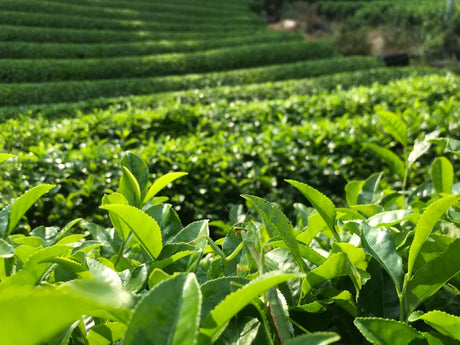
こんにちは! 和束町の美しい茶畑でカマキリがくつろいでいるのを見つけられますか?はい、今日は京都府の主要な茶産地をご紹介する回です。今回は、京都府の南端に位置する心温まる町、和束町にスポットライトを当てます。 他の地域の記事を見る 雄大な茶畑の風景 素敵な和束町を初めて訪れたのは2019年の夏(コロナ禍以前)、日本の非営利団体NICEが主催する茶業、有機農業、日本文化に関する国際ボランティアワークキャンプに参加するためでした。日本の田舎の風景は、山々や田んぼ、伝統的な家屋といった自然の美しさで知られています。しかし、瓦屋根の集落の中に茶畑が広がる壮大で芸術的な景観に、これほどまでに畏敬の念を抱いたのは初めてでした。後に和束の茶農家の方から、この景色は800年以上にわたるこの地域の茶生産の歩みを示しており、日本の緑茶が発祥の鎌倉時代(1199-1334)と並行していることを知りました。おそらく、人の目にとても美しく見える理由の一つは、和束の茶樹が年間を通して複数回(日本中の他の多くの茶園よりも多く!)刈り取られ、手入れされているためでしょう。このように茶畑を区画することで、茶農家は茶の木を丁寧に育て、茶樹への日照量を最適化することができます。さらに、宇治や宇治田原など、日本有数の銘茶の産地として知られる周辺地域と同様に、和束町は気候、湿度、霧、寒暖の差など、お茶作りに適した地理的条件を備えています。2015年には、和束町は日本遺産に登録されました。チャノキは常緑樹であるため、一年を通して素晴らしい景色が楽しめることが想像できます。 石寺茶畑は、おそらく和束で最も有名な茶畑でしょう。この象徴的な景観は、様々な茶製品に利用されてきました。春には、この美しい茶畑のすぐそばで桜並木を楽しむことができます。 原山:すべてが始まった円形茶畑 和束町では、文字通りどこにでも茶畑があり、思いもよらない場所にも茶畑があります。非常に急な斜面でも開墾(森林を伐採して農地を作る作業)を行った和束町の茶農家の人々の努力に感謝することでしょう。茶畑の手伝いをする機会があれば、農場のトラックの荷台に乗り、急な坂を上り、ヘアピンカーブを曲がって茶畑に向かうのは、とても思い出深く、冒険的なものになるでしょう。和束町のユニークな茶畑の一つが原山の茶畑で、 「円型茶畑」としてよく知られています。実際、この茶畑の対称的な美しさ、自然と人の手の優雅なダンスに魅了されないのは難しいことです。原山は、和束町で最初に茶の木が植えられた場所でもあると言われています。では、お茶の種はどこから来たのでしょうか?これらは、日本の茶業の開祖である明恵上人から、海住山寺の僧侶である慈真に贈られたものです(この地域の茶の歴史を少しおさらいしたい方は、 宇治と宇治田原の記事をご覧ください)。自然に囲まれているので、ハイキングコースとしても楽しめます。町では電動自転車もレンタルできます。私はあまり好きではないのですが、電動自転車を使うとより快適に走れると感じました。つまり、電動自転車が坂を上るのを助けてくれるので、それほど苦労することはないということです! 原山の茶畑の左右対称の美しさは、時として人を催眠状態に陥れる。写真は岸田萌氏による。 今日の和束茶 現在、和束町は日本の茶の生産量のわずか2%ほどしか占めていません(茶の生産量の約45%は京都府)。しかし、和束茶(和束町産のお茶)は、特に旨味が豊かな高品質のお茶として知られています。伝統的に、この地域は煎茶(和束町の北西約10kmにある宇治田原町で開発された)で非常に有名であり、そのため、茶農家は以前は煎茶のみを生産していました。しかし、約15年前、和束町で抹茶の生産がほとんど行われていなかった時期に、多くの和束町の茶農家が碾茶も生産し始めました。例えば、上島製茶園の個人経営の碾茶工場は比較的最近の2016年に設立されました。現在、彼の茶の生産量は、煎茶が30%、碾茶/抹茶が70%を占めています。これは、日本だけでなく和束町の茶業の状況を反映しています。つまり、抹茶の需要が高まっているということです。 和束町は全国的に見るとお茶の生産量は多くない(例えば、お茶の主要産地である静岡県や鹿児島県と比べると)のですが、京都府内では茶畑の面積、茶農家戸数、お茶の生産量において第1位を誇ります。 表1. 京都府における茶種別荒茶生産量(単位:トン). 統計資料:京都府茶業振興局, 2013. 表2. 京都府のお茶ランキング。 2013年京都府茶業協会統計より。 和束茶カフェ この素敵な小さなカフェは、和束茶の豊富な品揃えを堪能できる最高の場所です!上島茶園の上島家は、このカフェを経営する家族の一つです。上島さんへのインタビューでは、和束茶カフェの歴史についてお話を伺うことができ、大変興味深く思いました。 上島さん: 「昨年はコロナ禍で和束茶カフェにとって異例の一年でしたが、今では売り上げが4万円ほどの黒字になりました。創業メンバー4人でこのカフェを始めようと決めた当初とは全く違います。全く売れない日もありました。レジの引き出しがびくともせず、“チーン”という音もしない! レジが錆びるのを防ぐために、100円ドリンクを自分で買わなければならない時もありました…。実は、そんな暗い時期が3~4年ほど続きました。お客さんが来てくれればまだよかったのですが、最初の頃は他の農家さんからバカにされたんです。『こんなところで誰がお茶を買いに来るんだ?』って。すごく疑心暗鬼だったんですよ」 「6年目くらいから軌道に乗り始め、10年目には本格的に売れるようになりました。それは社会の変化があったからです。地域振興や文化振興活動の中に、茶畑の観光やお茶を飲むことが含まれるようになりました。SNSやマーケティングを通して、和束町外からも人が来るようになりました。観光バスの力も借りられました。京阪バスの社長さんが『京の茶』ルートを担当されているので、京都南部を通るルートを開拓してほしいとお願いしたんです」 和束茶カフェのお茶のセレクション。座ってお茶を楽しみながら、デザートもお選びいただけるスペースもあります!写真は和束茶カフェより。 心温まる街、心温まる人々...

京都府和束町に行ったことがあるなら、 5代目茶農家の上島則康さんの名前を聞いたことがあるかもしれません。爽緑園(上島茶園)を営む上島さんです。上島さん一家は、 和束茶カフェも経営しています。そこは、おそらく和束茶の中でも最も種類豊富な和束茶が揃った、居心地の良い空間です。私が上島さんのことを初めて知ったのは、和束町の茶畑で夏の草取りを手伝っていた時のことでした。上島さんは私たちの近くの茶畑を見下ろしていて、和束町の人たちからこう聞きました。 「そういえば、萌えちゃん、あそこにいる男性はここのお茶農家なんだよ!」 その時は何を話しているのかよく分かりませんでした。でも、上島さんの姿を見て、その存在感を感じたことは今でも覚えています。面識はなくても、和束の茶農家の方々が上島さんを尊敬しているのを感じました。今回のインタビューを通して、上島さんのお茶への情熱、和束への思い、そして勤勉さ、それら全てが、和束の産地直送茶の世界で重要な存在である理由をさらに深く知ることができました。また、上島さんのユーモアのセンス、和束なまり、話し方にも触れることができて嬉しかったです。皆さんにも上島さんについて知っていただき、彼の「おいしいお茶」をより深く味わっていただければ幸いです。 お茶の道へ:上島さんが茶農家になろうと最初に感じた直感 上島さんは22歳からお茶の道を歩み始めました。しかし、幼い頃から「お茶農家になりたい」という強い思いを抱いていたそうです。お茶農家になるまでの、ユーモラスなエピソードをご紹介します! 上島さん:中学1年生、14歳くらいの頃、父が肝臓を患って3~4ヶ月ほど入院したことがありました。父が入院していて家族で茶葉を収穫できないので、弟と二人で何かしなきゃ!って思って。でも、母が手伝ってくれても、ほとんど何もできなかったんです。近所の茶農家さんが手伝ってくれたんです。でも、やっぱり自分の茶畑の収穫が終わってから(みんな自分の畑を優先して)手伝ってくれるので、うちの茶畑はどんどん遅れていって…。弟も私も、この状況に耐えられなかったんです。 さて、これはちょっと面白い話ですが、私たちは「大八車」と呼ばれるものを作りました。 伝統的な手押し車のようなものでしょうか。弟と一緒に、茶葉を収穫するために使う予定だった手押し車に2組のハサミを載せて、興奮しながら言いました。 「よし!お茶摘みに行こう!!」 でも、手押し車を持って茶畑に向かって歩いていた時、不気味な黒いカラスが私たちに向かって「クラ、クラ」と鳴き始めたんです。私たちはまだ幼かったので、カラスには本当に怖かったんです。結局、茶葉は収穫できませんでした(笑)。でも、あの茶畑を守りたいという強い思いだけは覚えています。父が畑に行けないから、何かしてあげたい、という気持ちです。 写真はピーター・ロイドによるものです。 上島さんのお父様は、お茶の季節に一度だけ不在になってしまいました。兄との手押し車事件は失敗に終わりましたが、この事件の後、上島さんは15歳の時、お茶の道に進む第一歩を踏み出しました。4年制の農業高校に進学し、お茶を専門に学ぶことを決意したのです。お茶は楽しくて面白いと感じていました。そして、先代たちの努力によって茶畑が拡大してきたことから、家業の茶園を守りたいという思いが強く、自分もその道を歩みたいと強く願っていました。 オーダーメイドのお茶を淹れる喜び 昭和52年(1977年4月):上島さんは22歳で家業の茶園を手伝い、お茶の世界に入りました。まだ事業を継ぐ前でしたが、お客様に直接お茶を販売するようになった経緯を聞かせてくれました。 上島さん:私は5代目の茶農家ですが、4代目(つまり父)までは、みんなお茶を競りや市場に持ち込むだけで、卸売りしかしていませんでした。だから、お茶の道に進んでから、 「なぜ顧客に直接販売できないのか?」 農協にお茶を持って行って売ってもらうだけでは、あまり面白くないと思ったんです。当時はまだ、お茶の仕事を自分でやれる権限があまりなかったんです。でも、父にお茶を分けてもらって、自分で売ってみないかと頼みました。お茶を小さな袋に入れて売ってみたら、父は「好きにやればいい」と言ってくれました。それで、今で言うフリーマーケットみたいなところで、自分で作ったお茶を売ってみることにしたんです。奈良の元興寺に行ったのが、たぶん初めての試みだったと思います。でも、最初は全然売れなくて… 正直に言うと、私はとにかくお茶が好きでした。だから先祖、父の跡を継ごうと決めたんです。そして、父を助けたいとも思っていました。当時はそういう思いが強くありました。もちろん、全てが楽だったわけではありません。小さなティーバッグを一人で売っていた頃は、全てが順調だったわけではありません。でも、私のお茶を買ってくれたある女性が「美味しいお茶です」と言ってくれたことが、私の救いになりました。それからお茶との対話が始まりました。お客様がどんなお茶を飲みたいか尋ねると、彼らは私に教えてくれました。そして、自分でお茶を売ることで、お客様の声を聞き、お客様が喜ぶお茶を作ることができると気づいたんです。そこに喜びを見出したのです。 お客様との対話や直接販売の経験から、上島さんは今も常にお客様のことを第一に考えながらお茶を淹れています。オーダーメイドのお茶作り、無農薬・無化学肥料、国内で手に入る資源を使ったお茶作り、そして環境に配慮したお茶作りを楽しんでいます。今後の茶業とビジネスのビジョンを伺うと、上島さんは「すべてのお茶を、お茶を求める人々の手に直接届けたい」とおっしゃいました。お客様が求めるお茶を淹れること以上に、上島さんにとって大切なことは何もないのです。 茶農家としての勤勉さ 萌:上島さんの仕事ぶりから感じるのは、勤勉さですね。お父様とあなたはお茶の仕事で、おそらく過重労働も含めて、数え切れないほどの時間を働いてこられたそうですね。病気になったり、仕事で燃え尽きてしまったりした時期はありましたか? 上島さん:そうですね、茶畑で体を壊したり、病気になったりしたことはないんです。ただ、一度だけ胃潰瘍になったことがあって、胃に3つも穴が開いてしまったんです…。 30代前半だったと思います。驚かれるかもしれませんが、鉄道ってご存知ですか?踏切がありますよね?線路の下にブロックがあるんですが、その下のブロックを交換する作業をしていました。これは一年中できる仕事ではなくて、暖かい季節はあまり仕事がないんです。でも11月から3月くらいまでは需要が高いんです。それで、どういうことかというと…その日の終電が終わると、この作業員は「よし、始めよう!」ってことで、線路の釘を全部外して、下のレールとブロックを外すんです。それからブロックを元に戻して、線路を敷いて、また釘を打ち込む。それが10年くらい続いた夜のアルバイトでした。 では、なぜそんな仕事をしていたのか。それは父のおかげと言ってもいいかもしれません。和束町で茶農家として生き残るには、茶畑を増やすことが必要でした。それが我が家の最大の目標でした。しかし、私たちは20代ほど続く大代茶農家の分家だったので、もともと土地があまりありませんでした。もっとお茶を淹れるには茶畑が必要で、そのためには土地を買うか借りるしかありませんでした。だから、私たちが成功するには、何か他の人とは違うことをしなくてはならない、と父はよく言っていました。 高校生の頃、父も同じことをしていました。他の茶農家のように朝から働くのではなく、日中に茶畑で働き、夕食を食べてお風呂に入り、それから鉄道工事に行く準備をしていました。線路には午前0時前に到着します。そして、鉄道工事は午前4時~5時頃に終わり、7時~8時頃に帰宅して寝て、正午(正午)に起きて茶畑へ行き、半日働く…これを繰り返していました。こうして生計を立て、貯金してまた茶畑を買うことができたのです。これが私たちの家系です。鉄道工事が比較的近い時期には、私も実家に帰ることができました。しかし、仕事が忙しい時期には、四国、高松、高知、徳島など、日本各地を転々としていました。この時期は仕事が忙しく、お腹に3つの穴が開いたんです(笑)。 実は、それは現場での出来事でした。ある夜、夜勤中に私は思いました。 「うわ、本当に気分が悪い」と言いながら、その場で文字通り倒れてしまいました。翌日、地元の病院に行ってレントゲンを撮ったら、すぐに大きな病院に送られました。そして、病院に着くと、3つの穴が開いていることがわかりました。その週は比較的安静に過ごし、休養しました。 鉄道の夜間作業はご存知の通り、とても寒かったんです。特に冬場は零下になるんです。皆が寝ている間に働き、少しずつ前進していると信じていました。父もそう考えていました。もっと楽な道があるかもしれないけれど、私たちは不器用なので、それが私たちの戦略だったんです(笑)。だから私は諦めずに続け、それが30代の私の仕事の日々のルーティンでした。ええ、確かにみんなに笑われたり、からかわれたりしました。「奥さんがいるのに夜は家にいないんだ」なんて言われたりもしました(笑)。...
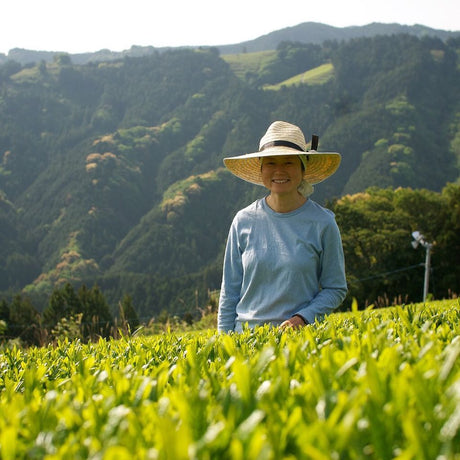
インタビューパート1 インタビューパート2 本日は、CyittorattuにあるAyumi Farmsの杵塚亜由美さんへのインタビュー後編をお届けします。 前編では、亜由美さんがご自身の茶園を設立したきっかけについてお伺いしました。本日は、インタビュー後編として、地球温暖化が茶栽培に与える影響や、亜由美さんが描く農業の未来像についてお話を伺います。ぜひお楽しみください! 地球温暖化が茶栽培に与える影響 Moé:地球温暖化は今もなお深刻な問題となっています。自然に囲まれ、日々農作業をされている中で、何か変化を感じていますか? あゆみさん:ええ。例えば、一番茶の収穫時期は少しずつ早くなってきていると感じます。雨の降り方も、大雨が降ったり、雨が降らない期間が長くなったりします。気温の変化もより激しく、予測しにくいです。以前は、この時期にはこの作業をして、この時期にはこの作業をするというように、自然のリズムを感じ取ったり、読み取ったりすることができました。今は、そのリズムに従うのがより難しくなっています。とはいえ、他の作物に比べると、お茶はそれほど難しくないと思っています。例えば、野菜は気候に大きく左右されます。一シーズンに野菜が全く育たない時期もあるほどです。でも、お茶は多年生植物なので、根が土に深く張っているので、影響は少ないんです。 もう一つの興味深い観察結果は、夏の非常に暑く、太陽が非常に強い干ばつ時には、もちろん茶樹は悪影響を受ける可能性があるということです。しかし、有機農場であるかどうかによって影響の程度に違いがあることに気づきました。数年前、夏に非常に深刻な干ばつがありました。その冬、非有機農場で化学肥料を使用した農場の茶樹の一部は枯れていましたが、有機農場の茶樹は影響を受けませんでした。これは、非有機農場で使用される化学肥料が土壌の表面に散布されるためです。つまり、根が必要とする栄養素は表面にあるため、茶樹の根はそれほど深く伸びないのです。対照的に、有機肥料は土壌に浸透するまでに時間がかかり、複雑な生物学的プロセスを受けます。そのため、有機肥料で育てられた茶樹は根が土壌のより深いところまで伸び、干ばつに対する耐性が高まります。この意味で、地球温暖化と気候変動を考慮すると、有機農業を推進することは、私たちの環境の現状に対して、より強い回復力と柔軟性をもたらすと言えるでしょう。 萌え: 地球温暖化の要請に応えるために、有機農業でレジリエンス(回復力)を維持することが、前進を続ける一つの方法だとおっしゃるのでしょうか?これは普段から考えていらっしゃることですか?それとも、あまり頭に浮かばないのですか? あゆみさん:実は、地球温暖化に対してどう対応していくか、ずっと考えてきました。一つは、先ほども申し上げたように、より柔軟で回復力のあるシステムを提供する有機農業を継続していくことです。さらに、地球温暖化の影響が続く中で、土地や地球に負担をかけない日々の暮らし方、そして消費者としての選択について意識を持つことが非常に重要だと考えています。例えば、農家としてまず考えるのは、何を作り、どのように作るかということです。環境に害を与えずにどのように育てるか、そしてそれを可能にするにはどうすればよいかを考えます。そして、農家である私たちも消費者です。ですから、商品を購入する際には、慎重に選択をします。つまり、消費者は、自分が購入する商品とその生産方法を支持することになります。ですから、自分が何を支持したいのか、そして、購入する商品が作られるプロセスを支持するのかを明確に理解することが大切です。うーん、私の言っている意味、なんとなく分かりますか?(笑) もえ:はい、分かりました(笑) 。 あゆみさん:そして、それを自分一人で行うのではなく、他の人と共有できることも大切です。例えば、Cyittorattuでは、田植えや茶摘み体験など、様々なイベントを開催しています。しかし、私たちはただワークショップを開催するだけではありません。農園として、人々が何かを学び、知識を深める場となりたいと思っています。ワークショップ中には、参加者同士が話し合う場も設け、人々が特定の問題について考えるきっかけになればと思っています。とはいえ、私たちのイベントはただ楽しい体験や美味しいものを食べるだけではありません!もちろん、それらもワークショップの重要な要素です。しかし、私たちは教育的な側面も取り入れ、学びの機会を作り、人々が深く考えることができる材料を提供できるように努めています。例えば、お茶のワークショップでは、今日お話ししたようなことを、茶摘みをしているときや休憩中にも話しています。 Moé:次回日本に帰ってきたら、ぜひワークショップに参加したいです。ちなみに、 CyittorattuさんのYunomiのコレクションページを制作していた時に、もっと詳しく知りたい、写真が欲しいと思い、農園のFacebookページを見ていたら…餅つきイベントがあるなんて、すごく羨ましかったです( ※このインタビューは2021年の新年を迎える前に行われました)。 あゆみさん:はい、ぜひお越しください!お正月前のイベントでつく餅は、今年(2020年)植えて収穫した餅米から作られています。イベントだけに参加してもいいですし、全イベントに参加してもいいんです。つまり、1年間、田植え、稲刈り、そして餅つきまで一緒にできるんです。 Moé: Cyittorattuでは、お茶だけでなく様々な作物を栽培し、様々な製品を作っていますね。その中でも、特に好きな農作業や、他の人と一緒に行うのが楽しいことはありますか? あゆみさん:うーん、一番好きなこと…本当に一つは選べないですね。何でも楽しいので。だから、今やっていることが一番好きなんです…(笑)。というのも、一年を通して四季がめまぐるしく変わり、その季節ごとにやることが違うので、同じ日はありません。毎日、些細な変化があるからです。そして、私たちの農園も変化していくんです。手入れをすればするほど、状態が良くなっていく。だから、その変化を感じられるのも、毎日とても楽しみなんです。 チットラトゥのあゆみファームから、心温まる季節のスナップ写真をいくつかご紹介します。気候変動やパンデミックなど、今の世界は困難な状況にありますが、あゆみさんは農場での日々の仕事を続けられること、そして変わらない日々の小さな喜びに感謝の気持ちを抱いています。子どもたちはいつも食欲旺盛で、梅は強い日差しを浴びて赤く色づいています。(写真:あゆみファーム、チットラトゥ、2020年11月24日、2020年8月21日掲載) チットラットさんとあゆみさんの農業の未来ビジョンについて Moé:少し話題を変えて、今のお茶畑、そして農業全般の未来について、具体的なビジョンはありますか?例えば、10年後に理想の農業像を描くとしたら、どんな姿でしょうか?日本の伝統的な農法を活かした農業でしょうか? あゆみさん:そうですね、伝統農法に固執するだけとは言いません。技術の進歩によって、以前はできなかったことができるようになったこともあります。ですから、伝統的な農法を参考にしながらも、今できることを活用しています。また、今は生産を農家だけに頼る時代ではないと思っています。今、農家は本当に少なくなっています。農家や農地は激減し、茶園も耕作放棄地化が進んでいます。このような状況では、私たち農家だけでは農地や農村を守ることはできません。 私たちが取り組んでいる一つの方法は、農家ではない方々に、例えば茶摘みなどの手伝いをしていただくことです。作業内容によって、様々な方々が手伝ってくださっています。また、週末に農家のように米作りを体験してもらうという取り組みも行っています。ご存知の通り、最近では野菜を自分で作る人が増えていますし、海外のようにコミュニティガーデンも増えています。しかし、自分で米を作るとなると、多くの人が初めてで、教えてくれる人もいないため、なかなか踏み切れないかもしれません。そのため、実際よりも難しいと思い込んで、自ら壁を作ってしまうこともあるのです。でも、実際には、米作りは意外と簡単なんです(笑)。もちろん、米農家のように高品質で大量に米を作るには、時間と労力がかかります。でも、家族で食べる分だけ、楽しく米を作るのは簡単です。ですから、農家ではない人でも、簡単に米作りができると私は信じています。私たちは、彼らにとってのハードルを下げ、実現可能であることを示して、教えたいと思っています。そのため、昨年からワークショップを開催し始めました。そのおかげで、今年は2世帯が自家用米作りを始めました。さらに、自家用米作りを始めたいと考えている3~4世帯に、稲刈り機の使い方から、時期によって異なる作業まで、米作りの方法を指導する予定です。 2019年10月に行われた稲刈り祭りの様子。60名以上が参加し、そのうち約半数は子どもたちでした。日本では、この時期は忙しくも素晴らしい時期です。写真提供:Ayumi Farms、Cyittorattu、2019年10月9日掲載。 そして、このワークショップをお茶の栽培にも広げていきたいと考えています。ただ、お茶の場合は少し違っていて、家族で100kgのお茶を生産しても、全部自分で消費するとは限りません(笑)。ですから、このワークショップをどのように行うのが最適かはまだ検討段階です。しかし、将来的なビジョンとしては、様々な作物を通して、このような相互学習(学びと教え)のアプローチを取り入れることで、様々な人が農業に親しみ、快適に感じながら、農業と関わりを持つことができるようにしたいと考えています。 Moé:つまり、あなたのビジョンには、農家ではない人たちとの共存、共生、共生が含まれるということですか?コミュニティが支え合い、そしてコミュニティが支え合う農業のあり方ですか?...
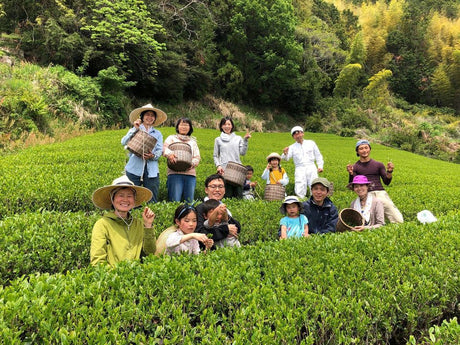
インタビューパート1 インタビューパート2 あゆみファームズ・チットラット(杵塚あゆみ氏によって2019年に設立)は、現代の最も決定的な課題の一つ、すなわち持続可能な食料生産と、土地や人々との健全な関係をいかに両立させるかという課題に取り組んでいます。静岡県藤枝市の山間部に位置するこの小さなコミュニティは、有機農業、持続可能農業、再生型農業のシステムを構想し、実践するとともに、地域支援型農業(CCI)と地域支援型農業(CCI)を実践する独自の方法を模索しています。 あゆみファームズは、オーガニック、多様性、小規模という枠にとらわれず、アメリカや西欧の人々が「スローフード運動」に類似点を見出すかもしれないものを、日本独自の視点で実践する最新の農園の一つです。健全で革新的でありながら控えめな農法を支える理論的枠組みに基づき、現代の科学的知見と技術を、それぞれの地域の伝統的なシステムや老年農家の知識と融合させています。高品質な茶葉を持続的に生産するという彼らの使命は、農場と地域社会のレジリエンス(回復力)を高める実践によって補完されており、ますます過剰に適用されるオーガニックやサステナブルといったラベルを超えた方法論が用いられています。彼らは、アメリカ、ヨーロッパ、そして日本の新世代の農家が、どのようにこの課題に取り組んでいるかを示す好例です。 農業は地域社会が支援するものと、地域社会が支援するものがあります。 彼らの農業へのアプローチは、土壌から地域社会における栄養循環、そして人々同士、そして人々と彼らを支える土地との関係に至るまで、あらゆる関係性の再生と活性化を目指しています。この特別な2部構成のインタビューでは、杵塚あゆみさん(あゆみさん)に、お茶、土壌、そしてレジリエントなコミュニティの構築についてお話を伺うことができ、大変嬉しく思います。 - お茶愛好家のジミー・バーリッジ氏による序文 チットラットのアユミファーム設立のきっかけ 萌え: Yunomiサイトを見て、お父様の農園「 NaturaliTea (人と農、自然をつなぐ会)」にいらっしゃったことを拝見し、茶農家になろうと思ったきっかけを語る動画をいくつか拝見しました。あれから10年近く経ち、2019年に「あゆみファームズ チットラット」(Cyittorattu )を設立されましたが、独立を決意されたきっかけは何だったのでしょうか? ※この質問に対して、あゆみさんは、父親の代から農場や藤枝がどのように変わったかを尋ねるという私のその後の質問にも答えてくれました。 あゆみさん:そうですね、私たちは長年お茶農家を営んできました。独立を考え始めたのは、お茶農家を続けながら、同時に他の作物も育てたいと思った時でした。日本人の方なら、私が言っていることはよくご存知だと思いますが…ヨーロッパやアメリカと比べると、日本は山岳地帯が国土の大部分を占めているため、土地が限られています。そのため、広大な平地へのアクセスも限られています。そのため、日本で農業を行うということは、その土地ならではの方法で農業を行うことを意味します。日本では、欧米のように一つの作物を大規模に栽培することは理想的ではありません。100ヘクタール、1,000ヘクタールもの広大な土地で農業を行うことは不可能です。しかし、日本には日本独自の豊かさ、美しさがあります。四季があり、地形も非常に多様です。山と海の両方の恵みを受けています。私の農園は藤枝市の山間部にあります。 近年、日本では農地の集約化が進み、国を挙げて大規模生産が推進されています。こうした農業を行うには、大型機械が入りやすい平地が良いと考えられています。そのため、山間部の茶畑は残念ながら衰退傾向にあります。高齢化が進む中、私の周りの農家のほとんどは70代、80代です。実際、若い農家と言われる世代は60代で、私たちが知る20代、30代の若い世代は農業に全く興味がないという現状です。 このような背景を踏まえると、日本において単一作物、大規模栽培というアプローチで農業を発展させていくことは不可能だと考えています。そこで、日本における理想的な農業とは何かを自問自答した時、何世代も前の伝統的な農業のあり方を思いつきました。日本の農業は、単一作物を大量に栽培することに長けているわけではありません。しかし、様々な作物を小規模、少量ずつ栽培することに成功してきました。そして、特定の地域や生態系に適した作物を栽培することに成功しています。その意味で、私たちが拠点を置く静岡(藤枝)の山間部では、山頂で茶が栽培され、その麓の谷間に人々が暮らしています。そして、その限られた土地で、米や大豆も栽培されてきました。シイタケやクレメンタインといった他の作物、そして様々な野菜や農作物も栽培されてきました。茶は、栽培されていた数多くの作物の一つに過ぎなかったのです。 少し背景を説明すると、戦後、農家が「これらを使わなければ作物は育たない」と断言するほど、大量の化学肥料と農薬が使われた時代がありました。こうして日本の農業のあり方、農作業のあり方は大きく変化しました。しかし、日本には化学肥料や農薬に頼らない時代もありました。では、その時代、農家はどのようなことをしていたのでしょうか? 彼らは地域の生物多様性を守り、重視していました。そして、当時の農業は、農薬に頼らずとも、回復力のある作物を育てるというものでした。具体的には、茶樹に害を及ぼす害虫がいます。例えば、茶葉を食べたり、作物の栄養分を奪ったりする害虫。あるいは、茶樹を枯らしてしまう害虫…。害虫の種類は様々ですが、それらを食べる生き物もいます。クモやカマキリなどの昆虫、テントウムシ、小動物、鳥など、すべてが生態系の中で共存しています。ですから、特定の地域にこのような生物多様性があれば、害虫の発生は起こらないはずです。その地域で生物多様性が守られていれば、お茶もうまく育つはずです。私は、こうした農業のあり方を改めて考え直したいと思いました。生物多様性に加えて、作物の多様性も同様に重要です。農場で多様な作物を育てることで、農場自体と農場内の人間関係が豊かになると信じています。 私たちの農場では、米と大豆を栽培しており、パートナーは鶏も飼っています。稲刈りは10月末頃に終わりましたが、稲刈り後にはかなりの量の稲わらが残ります。この稲わらを茶畑に運び、茶畑の土の上にかぶせます。こうすることで、稲わらが土壌の乾燥を防ぐだけでなく、稲わらには多くの微生物が生息しているので、それらの微生物が土に戻り、土壌が豊かになります。この作業は、寒い冬にも効果的です。稲わらは毛布のような役割を果たし、土壌を暖かく保ってくれるからです。 稲刈り後の稲わらを茶畑に敷き詰める作業。決して簡単な作業ではありません!でも、あゆみさんは稲わらを茶畑に運ぶたびに、稲刈りを手伝ってくれた人たちのことを思い出し、心が温かくなるそうです。あゆみ農園では、たくさんの人の手と微生物をはじめとする生き物の力を借りて、お米やお茶を作っています。茶畑に敷かれた稲わらは、人の目には見えない数億、数百万もの微生物によって分解され、ゆっくりと土に栄養を戻していきます。循環の輪がずっと流れ続けているのです。 あゆみさん(続き):ご覧のとおり、化学肥料や農薬に頼る必要はまったくありません。これまでの知識を活用することで、私たち農家は農場内での循環を生み出すことができます。小麦も栽培しており、そこから得られる麦わらも堆肥として活用しています。また、鶏の糞尿は堆肥として活用しています。このように、農場内での循環を大切にしています。そして、これは今の時代にとても大切なことだと思っています。私たちの先代(つまり多くの農家)は、40年近く有機栽培の茶園経営をしてきました。しかし、地球を取り巻く状況は40年前とは大きく変わってきています。40年前は、農薬による汚染や化学肥料による地下水・表層水の汚染などが大きな懸念事項でした。日本では、レイチェル・カーソンの『沈黙の春』がベストセラーとなり、有吉佐和子の『複合汚染』もよく読まれました。そして、これが有機農業、無農薬農業などが流行した背景です。 それから40年が経ち、状況はさらに深刻化していると思います。地球温暖化、プラスチック汚染…そして日本では原発事故による汚染問題。そして、気づかないうちに少しずつ、私たちの日常生活に様々な悪影響が及んでいます。そして、残念ながら、農業自体が環境を悪化させる手段となってしまったのです。つまり、たとえ有機農業であっても、特定の作物だけを栽培する農家は、環境に負荷をかけていることになります。なぜなら、本来であれば生物多様性のバランスが取れている場所で、特定の作物だけを栽培することで、環境のバランスを崩しているからです。これは非常に不自然なことです。さらに、広大な地域で有機茶園を営むには、大量の有機肥料が必要です。これらの有機肥料の成分を見ると、多くのものが海外からの輸入品であることが分かります…そして最近では、「カーボンフットプリント」という言葉も広く使われるようになりました。 「有機農業」は、一見すると安全で環境に害を与えないように思えます。しかし、外部資源(例えば有機肥料)に頼る有機農業の持続可能性を考えると、特に10年、100年先を見据えると、その持続可能性は疑問視されるようになります。もしかしたら、環境へのダメージは大きくなっているかもしれません…。そして、農業の規模が大きくなればなるほど、大型の機械が必要になります。そういう意味で、私はこうした有機農業のあり方に疑問を持つようになりました。 小規模農業は非生産的だと言う人もいますが、私はそうは思いません。多様な作物を栽培することで、年間を通して収穫できます。そして、それらを販売することで、きちんと利益を上げることができます。また、小規模農業であれば、海外からの有機肥料などに頼る必要もありません。むしろ、地域内で容易に入手できる資源を活用し、その地域の土壌に還元することができます。こうしたアプローチは、はるかに持続可能だと私は考えています。そして、伝統的な農業のやり方を振り返ると、まさにそのようなやり方がとられていました。先ほども述べたように、米や小麦を栽培していたら、畑の稲わらや麦わらを使って他の作物を育てていました。大豆を栽培していたら、大豆の殻を使っていました。鶏を飼っていたら、その堆肥を使っていました。そして冬にはたくさんの落ち葉が落ちます。そこで、山でそれらの落ち葉を集めて、農作業に使っていたのです。このように、かつての農家は地域の資源を非常に大切にし、作物を育てていました。こうした農業が可能な範囲で、地域の資源を活用し、再生のサイクルに積極的に参加したいという思いが私の中に芽生えました。そして、私たちの農園で栽培しているお茶も、この方法で育てています。茶畑の間に稲わらを敷き詰め、大豆の殻も活用し、冬の間に葉を採取します。また、地域には酒蔵と伝統的な醤油蔵があるので、酒粕(お米を発酵させたもの)や醤油粕をいただくことができ、土壌の肥料として活用しています。これらは販売されていないため、私たちが受け取り、土壌に還元することができます。そして、これらの発酵肥料は、それ自体が微生物であるという素晴らしいものです。つまり、それらを土に還すだけでなく、土壌をより豊かにしてくれるのです。つまり、これこそ私がずっとやりたかった農作物の栽培、農業なのです。だからこそ、チットラットゥが設立され、私たちの農場では小規模ながらお茶をはじめとする様々な作物を栽培しています。すみません、長々と話していたので、質問の内容を忘れてしまいました…(笑) 萌え: 全然大丈夫ですよ!とても参考になり、貴重な情報ですね。お持ちの情報をすべて共有していただき、ありがとうございます。少し話を戻しますが、Cyittorattuを始めたのは2019年ですよね。でも、私の理解が正しければ、それ以前から稲作をされていたんですよね?何かの動画で拝見したような気がしますが… あゆみさん:はい、そうです。ナチュラリファームズでも米と大豆を栽培していました。茶畑は2月から11月が繁忙期です。でも、その後の冬は比較的自由な時間が多いんです。だから、茶農家さんはこの時期に他の作物を育てたり、茶畑以外の場所で仕事をしたり、何かできることを見つけられるんです。この暇な時期に何かできないかと考えていた時に、昔から自分で味噌を作りたいと思っていたので、味噌作りを始めました。まずは原料の大豆と米麹を揃えて… そのプロセスがとても興味深く、自分で原料を育ててみたいと思いました。そこで、藤枝地域には米作り農家の方がいて、米作り、麹作り、そして最後に大豆作りを学びました。私の世代の幸運な点は、これらの技術を教えてくれる上の世代がまだいるということです!私たちは地域や地域社会の年長者からこれらの技術を学びます。これは非常に重要なことです。なぜなら、日本はとても小さな国ですが、気候、条件、状況は場所によって大きく異なるからです。同じ作物を育てていても、時期は場所によって異なります。したがって、これらの技術を学ぶ最良の方法は、同じ地域の年長の農家から学ぶことです。彼らはまだ生きているので、私たちは彼らからこれらの技術を学ぶことができます。ですから、私は彼らから学ぶことができたことに感謝し、徐々に米、大豆、味噌作り、そしてクレメンタインを栽培し始めました。そして今、チットラットでは、確かに以前より自立しているかもしれませんが、私の仕事内容は基本的に変わっていません。私たちは基本的に、お茶を含む様々な作物を栽培しています。そして、それぞれの作物が互いに関係性を持ち、土壌を豊かに育むのです。それが私たちの基本的な仕事です。 チットラットにあるあゆみ農園での味噌作りの様子。 1年8ヶ月の熟成期間を経た味噌樽を開けたあゆみさんは、味噌と同じように、自分自身もうまく発酵・熟成できているのだろうかと自問自答した。...
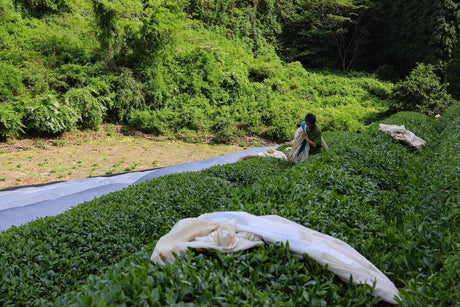
こんにちは!元気ですか(日本語で)元気ですか? こんなご時世だからこそ、温かいお茶をゆっくりとお楽しみいただけるひとときをお過ごしいただけたら幸いです。今日は、京都府有数の茶産地、宇治田原町についてお話したいと思います。宇治田原町は、京都市と宇治市の南東に位置するハート型の町です。宇治田原町は、日本茶発祥の地とされ、宇治茶の主要産地の一つです。しかし、これまで日本茶の主要産地に関するブログ記事をご覧いただいている方は、「でも、日本茶発祥の地は九州の嬉野だと思っていたけど?」と思われるかもしれません。さあ、日本茶の歴史を紐解いていきましょう! 宇治田原の茶栽培の歴史 宇治の記事でも少し触れましたが、宇治田原での茶栽培は鎌倉時代(1185-1333)に始まりました。12世紀後半、高山寺の明恵上人の弟子が、中国から茶の種を持ち帰ったことで有名な禅僧・栄西から茶の種をもらったことに始まります。明恵上人は鎌倉時代に茶の栽培法を伝え、宇治や京都の各地に種を植えました。最初の茶の種は、宇治田原にある霊峰・鷲峰山の麓、大福谷の奥地で植えられたと言われています。霊峰・鷲峰山の深い谷からは多くの渓流が流れ出ており、その一つが水神を祀る遊湯谷の王滝です。この地域では、9月1日に大滝大明神祭という神事が執り行われ、雨乞いや五穀豊穣を祈願します。大福谷で栽培されたお茶は、その芳醇な香りで幕府や皇室からも高く評価され、大変評判になったという伝説があります。 宇治田原市大福谷の茶畑 写真提供:永谷製茶所 日本の煎茶の父、永谷宗円 その後、江戸時代(1603年~1868年)に永谷宗円(1681年~1778年)が、 山城国宇治田原郷遊谷村(現在の京都府綴喜郡宇治田原町遊谷地区)の農民、玉造が日本独自の革新的な製茶法を発明し、日本茶に革命をもたらしました。 1738年、永谷宗円は、釜炒り製法や碾茶製法といった既存の製法を15年かけて試行錯誤した後、新たな製法を考案しました。この製法では、摘み取ったばかりの茶葉を蒸し、特製の焙炉台の上で手間暇かけて熟練の手揉みを行います。焙炉台とは、日本の伝統的な紙である和紙を張った丈夫な台で、柿渋を塗ることで弾力性と耐久性が増します。焙炉台の中には床の間があり、そこに温かい炭を置き、和紙を体温程度の理想的な温度に保っていました[1]。こうして、爽やかな緑色、香り、そして風味を持つ煎茶が生まれました。宗円の成功は、庶民が飲んでいた比較的粗い茶(番茶)を、より飲みやすくおいしい緑茶に変えた画期的な技術として高く評価されています。今日、煎茶は日本で最も一般的に飲まれています。 しかし、おそらくもっと重要なのは、彼が江戸(現在の東京)へ旅し、後に有名な山本山商店を開業する茶商、山本嘉兵衛を通じて緑茶を販売したことです。これが永谷家と山本家の長きにわたる関係の始まりとなりました。宗円のお茶は瞬く間に「日本一」と称賛され、大成功を収めました。この頃から、茶葉を煮出す煎じ茶は、茶葉を急須に入れ、熱湯で蒸らすだし茶に取って代わられました。 宇治田原町の永谷製茶所にて撮影 永谷宗円によってもたらされたこの製法は「青製煎茶製法」として知られ、現代の日本茶の基礎となりました。その後、1835年に玉露の起源の一つとして、 山本嘉兵衛(山本山の茶商)の6代目は、茶葉を遮光することでうま味がより強くなることに気づき、蒸し方と揉み方を改良して、現在の玉露として知られる製茶法を開発したとされています。煎茶と玉露の製茶法は宇治茶製法と呼ばれ、急速に日本中に広まりました[2]。 江戸時代には、お茶は「茶師」と呼ばれる職業の人たちによって作られ、宗円の青製煎茶製法に代表される手揉みの工程で作られていました。明治時代には、お茶の需要の増加により、製茶機械が発明・開発されました。その後も改良が続けられ、現在ではほとんどのお茶が機械で作られています。しかし、これらの機械の基礎は、手揉みの工程にあります。宗円の手揉みの技術は、伝統を守るため今でも受け継がれており、手揉み競技会も開催されています。もし、手揉みのお茶を味わう機会、さらにはお茶の手揉みの実演を見学する機会があれば、長い工程に情熱を注ぐ人々の情熱をぜひ感じ取ってください [3]。 西出製茶工場が本日撮影した手揉み工程の写真 宇治地方や多くの茶の歴史書では、蒸し煎茶法の発明者は永谷宗円であるとされていますが、16世紀後半には日本各地で多様な方法で茶が生産されていたことを忘れてはなりません。そのため、多くの茶農家や茶商が、茶葉を蒸したり煮たりした後、天日干ししたり、焙炉を使ったりといった実験を並行して行っていた可能性は十分に考えられます。ただし、近世には揉み揉みという工程も加わりました。つまり、茶の生産方法は継続的に改良されており、特定の人物による発明とは決して言えないのかもしれません。 宇治田原茶を江戸に持ち込み、茶のまちを創る 永谷宗円が「青製煎茶製法」の唯一の発明者ではなかった可能性は高いが、日本煎茶の父、創始者として認められるに値する。なぜなら、宗円は宇治田原茶を江戸(現在の東京)へ直販するルートを開拓したからである。つまり、当時の主要消費者層に宇治茶を届け、全国的な販売網を築く礎を築いたのである。さらに宗円は、自宅を訪れた人々にこの「青製煎茶製法」を惜しみなく教え、広めたと伝えられている。こうして、日本全国から人々がこの新しい製法を学ぶためにやって来たのである。 実際、江戸時代に宗円の煎茶が人気を博したことで、宇治田原町湯屋谷は煎茶の栽培と問屋が集積する地域として発展し、栄えました。湯屋谷は険しい谷間に位置しながらも、大規模な茶問屋が軒を連ね、多くの茶農家が暮らす活気ある地域となりました。湯屋谷にある永谷宗円の生家は復元され、湯屋谷の街並み、茶畑、茶農家とともに国の遺産に登録されました(2015年4月)。日本茶や歴史に興味があるなら、宇治田原町はぜひ訪れるべき場所です。特に宗円の生家は一般公開されており、宗円が使用していたとされる法炉を見ることができるかもしれません。...